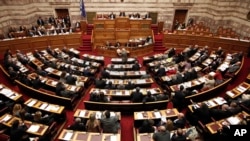Greece's government brought forward on Monday a crucial presidential vote by two months to next week, in a surprise gamble aimed at ending political uncertainty that has hung over the country for months.
The decision came after eurozone finance ministers said they were in favor of granting Greece its request for only a two-month extension to its bailout program, a boost for Prime Minister Antonis Samaras who has been pushing for an early exit from the program which is deeply unpopular in Greece.
Parliament's vote to select a new president, the first round of which will be held on Dec. 17 instead of Feb. 15 as previously scheduled, could trigger early elections if Samaras fails to get his candidate for president elected.
He needs the support of 180 lawmakers in the 300-seat chamber to scrape through the vote -- support he does not currently have.
However, officials and analysts said the move to bring forward the vote was a sign that the coalition government, which has 155 lawmakers in parliament, has improved prospects of securing the level of support it needs to survive.
Greek law stipulates that parliament must be dissolved and new elections called if parliament cannot elect a president.
“The market's sentiment is that the prime minister is now more certain that he will find the 180 MPs, as the government tries to put an end to political uncertainty,” Beta Securities analyst Takis Zamanis told Reuters.
The decision effectively throws down the gauntlet to nearly two dozen independent lawmakers sitting on the fence, allowing Samaras to argue they have a choice on whether to side with his pro-bailout government to lead Greece out of the woods or usher in a new period of uncertainty with snap elections and the potential victory of leftist radicals who have vowed to tear up the bailout.
Blackmail Votes
Government officials said the move by eurozone ministers to grant Greece a two-month extension to its bailout rather than settle for a six-month extension that Athens objected to, was a boost, giving the country just enough time to wrap up a delayed bailout review before it exits the program for good.
“There is a positive momentum right now and we are optimistic. We can't let political uncertainty prevail,” a government official told Reuters.
Samaras has yet to announce his candidate for the presidency. The vote will be held over three rounds, with the final round expected late December.
Samaras had been staking his survival on exiting the unpopular EU/IMF aid program by the end of this year, but the plan ran into trouble as Athens and its lenders haggled over next year's budget.
Greece still needs to resolve the final bailout review with its lenders and finalize details of the bailout exit, including the conditions tied to an interim, post-bailout program.
By holding the presidential vote while those negotiations are still going on, the government appears to be gambling that it has a better shot of securing support now rather than leaving it to February and allowing a period of general political malaise to continue.
In a statement on Monday, the government blamed the leftist opposition for undermining efforts to seal a deal with lenders.
Opinion polls show the leftist Syriza party would win if early elections were held right now. The leftist party welcomed the move to hold the presidential vote next week, saying it would only pave the way to early elections that the country needs.
“The decision -- in coordination with the [EU/IMF] troika -- to speed up the presidential vote, is a hopeless effort to hide new [austerity] measures and blackmail the votes of lawmakers,” the party said in a statement. “They won't make it.”
Syriza has vowed to abandon any cooperation with EU/IMF lenders, and promised to reverse austerity cuts taken in recent years -- a stance that has spooked markets wary of Greece going off the path of fiscal rigor just as it straightens out its finances and returns to economic growth.
The country exited a painful six-year recession this year and has tapped bond markets twice after a four-year exile, but investors have begun to fear a return to the days of crisis as the presidential vote looms.
“I believe that the government made the right move by cutting down the period of political uncertainty and by adding a new element in the dilemma: whether the negotiation with the troika will be concluded by this government or risking with another government, which might never conclude it,” Costas Panagopoulos of Alco pollsters said.





